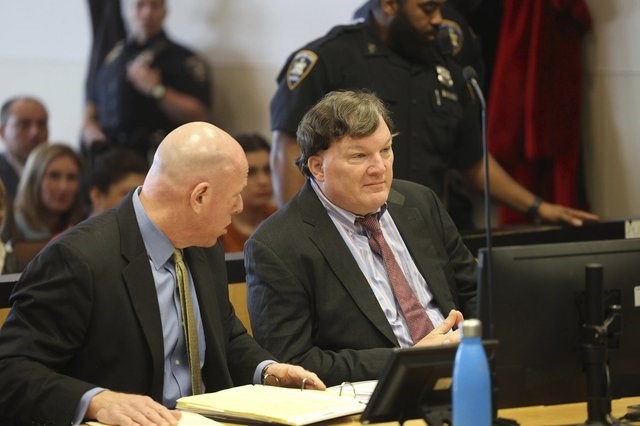
Rex Heuermann, charged in a string of deaths known as the Gilgo Beach killings, appears with his attorney Michael Brown, in Judge Tim Mazzei's courtroom at Suffolk County Court in Riverhead, N.Y. on Friday, March 28, 2025. (James Carbone /Newsday via AP)
Republished March 28, 2025 - 3:41 PM
Original Publication Date March 28, 2025 - 12:06 PM
RIVERHEAD, N.Y. (AP) — The question of whether certain DNA evidence can be used in the upcoming trial of a Manhattan architect charged in a string of deaths known as the Gilgo Beach killings is the focus of court hearings that began Friday on Long Island.
Lawyers for Rex Heuermann want DNA tests conducted by Astrea Forensics on hairs recovered from most of the seven victims in the case to be excluded from the trial, saying the California-based lab's method has never been accepted in a New York court of law.
But an academic expert testifying in the pre-trial hearing in Riverhead court said the type of testing used, known as nuclear DNA, or “whole genome sequencing,” is widely accepted in the scientific community.
Dr. Kelley Harris, a University of Washington professor of genome sciences, described Astrea Forensics' method as an “elegant and powerful” way to determine whether hair fragments pulled from a crime scene match those taken from suspects.
Heuermann’s attorney, Michael Brown, sought to temper Harris’ testimony, noting during his cross-examination that she had no background in the forensic science used in criminal cases.
He also pressed Harris on her close ties to the co-founder of Astrea Forensics, Dr. Richard Green, who she has coauthored research papers with and considers a colleague.
“She’s the witness for hire, and she was suggested by Dr. Green to be a proponent of this magic, as we call it,” Brown said after the daylong hearing.
He also took aim at Astrea Forensics' use of the publicly accessible 1,000 Genomes Project, which sequenced the DNA of some 2,500 people worldwide, as the reference pool for comparing hair samples in the case.
“Hopefully the point got across that it has no business being utilized in a criminal court,” Brown said outside court. “The 1,000 Genomes Project has been around for quite a while and it’s never been used in a forensic setting, and the reason they don’t use it as a population reference is because it’s simply not enough people to compare it to.”
The proceedings continue next Wednesday when other experts are expected to testify before Judge Timothy Mazzei renders a decision.
Heuermann, who was dressed in a dark suit, didn't speak during Friday's hearing. Asa Ellerup, who reached a divorce settlement with Heuermann on Thursday, was also in court, along with the couple’s daughter and the family’s lawyer.
No trial date has been set for the case, which spans decades of killings on Long Island.
Heuermann’s legal team also wants to break the case into multiple trials over concerns about the “cumulative effect” of the evidence presented by prosecutors. Suffolk County District Attorney Ray Tierney’s office has opposed that request. Mazzei is expected to rule on it soon.
Prosecutors argued in legal briefs ahead of the hearing that whole genome sequencing has been accepted in peer-reviewed scientific journals and by federal regulators, paleontologists, virologists and medical communities.
They say the findings by Astrea Forensics were also independently corroborated by another lab’s mitochondrial DNA testing -- a methodology long accepted by New York courts.
Since late 2010, police on Long Island have been investigating the deaths of at least 10 people — mostly female sex workers — whose remains were discovered along an isolated highway not far from Gilgo Beach.
Heuermann, who lives in nearby Massapequa Park, was arrested in 2023 and charged in the deaths of three of the victims between 2009 and 2010: Melissa Barthelemy, Amber Lynn Costello and Megan Waterman.
While in custody, he was subsequently charged in the deaths of four other women: Valerie Mack in 2000, Jessica Taylor in 2003, Maureen Brainard-Barnes in 2007 and Sandra Costilla in 1993.
Heuermann has maintained his innocence and pleaded not guilty to all counts.
___
Follow Philip Marcelo at twitter.com/philmarcelo.
News from © The Associated Press, 2025